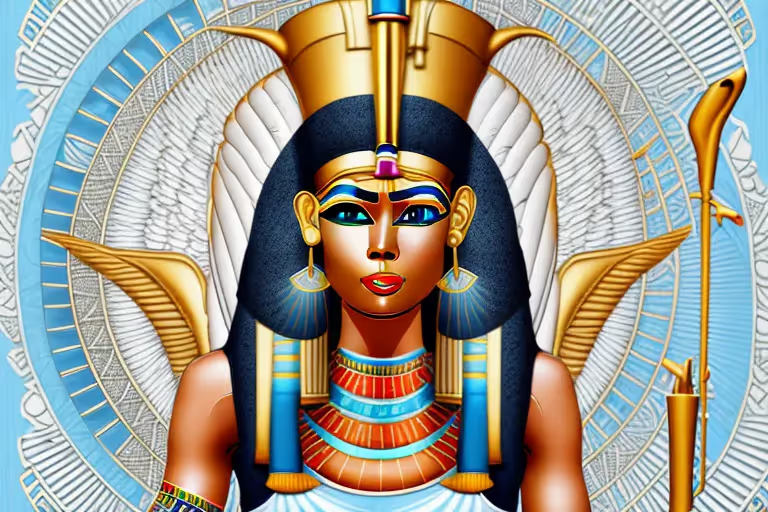Isis is a powerful and mystical goddess who has captured the imagination and hearts of people for thousands of years. Her influence can be seen throughout ancient Egyptian mythology, art, and religion. In this article, we will embark on a journey to explore the origins and significance of the goddess Isis.
The Mythology of Isis
In ancient Egyptian mythology, the goddess Isis was worshipped as the mother goddess, symbolizing fertility, creation, and the cycle of life and death. She was also revered as the goddess of magic, wisdom, and healing. Isis was one of the most important goddesses in the ancient Egyptian pantheon, and her mythology spans thousands of years.
Isis was a complex goddess with many different aspects. She was known as the "Lady of the Words of Power," and was believed to have the ability to control the elements and to command the gods themselves. She was also associated with the moon, and was believed to have the power to control the tides and the seasons.
The Birth of Isis
According to Egyptian mythology, Isis was born to the god of the earth and the goddess of the sky. She was the sister of Osiris, Set, and Nephthys. As a child, she was said to have great powers and was able to perform magical acts that astounded even the gods. She was later married to her brother Osiris, with whom she had a son, Horus.
Isis was known for her beauty and her wisdom. She was said to have a voice that could calm even the most turbulent of waters, and her eyes were said to be as bright as the stars themselves. She was also known for her compassion and her ability to heal the sick and wounded.
Isis and Osiris: A Love Story
The story of Isis and Osiris is one of the most enduring myths in ancient Egyptian mythology. It is a story of love, sacrifice, death, and resurrection. According to the myth, Osiris was killed by his jealous brother Set, who cut his body into pieces and scattered them throughout Egypt. Isis searched tirelessly for her husband's remains and eventually, with the help of the god Thoth, was able to piece together his body and bring him back to life.
The story of Isis and Osiris is often seen as a metaphor for the cycle of life and death. It is a reminder that even in the face of death, there is always the possibility of rebirth and renewal.
The Resurrection of Osiris and the Birth of Horus
After Osiris was resurrected, he became the god of the underworld, and Isis became the goddess of life and resurrection. The two of them conceived a son, Horus, who was the god of the sky and the protector of the pharaohs. Horus was said to have defeated Set and avenged his father's death, becoming one of the most important gods in the Egyptian pantheon.
The story of Horus is an important one in Egyptian mythology. It is a story of triumph over adversity, and of the power of love and family to overcome even the greatest of challenges.
Isis as the Divine Mother
Isis was worshipped as the divine mother, symbolizing the nurturing and protective qualities of motherhood. She was often depicted as holding the infant Horus in her arms, nursing him, and protecting him from harm. This depiction of Isis as a motherly figure inspired a great deal of devotion and reverence among the ancient Egyptians, who saw her as a source of comfort and protection.
Isis was also associated with the Nile River, which was seen as the lifeblood of Egypt. She was believed to have the power to control the waters of the Nile, and was often depicted as pouring water from a jar, symbolizing the life-giving power of the river.
Isis was a goddess of great power and importance in ancient Egyptian mythology. Her story is one of love, sacrifice, and rebirth, and her legacy lives on to this day.
The Origins of Isis Worship
The worship of Isis can be traced back to pre-dynastic Egypt, where she was worshipped as a fertility goddess and protector of women. Over time, her mythology and influence grew, and she became associated with many different aspects of life and death.
Pre-dynastic Egypt
In pre-dynastic Egypt, Isis was worshipped as a goddess of fertility and the protector of women during childbirth. Her cult was closely associated with the cult of Hathor, who was also a fertility goddess. The ancient Egyptians believed that Hathor was the mother of the pharaohs, and that Isis was her daughter. As such, Isis was seen as a powerful protectress of the pharaohs, and her worship was closely tied to the political and social structures of ancient Egypt.
Isis was also associated with the Nile River, which was the lifeblood of ancient Egypt. The annual flooding of the Nile was seen as a symbol of the goddess's fertility, and her worship was closely tied to the agricultural cycle. The ancient Egyptians believed that Isis was responsible for the growth and abundance of crops, and that she could protect them from drought and famine.
The Old Kingdom and the Pyramid Texts
During the Old Kingdom, Isis was worshipped as a goddess of the afterlife and was closely associated with the pharaohs. Her cult grew in popularity, and she was often depicted in the Pyramid Texts, which were inscribed on the walls of the pharaohs' tombs. The Pyramid Texts were a collection of spells and incantations that were intended to help the pharaohs navigate the afterlife and achieve eternal life.
Isis was often depicted in the Pyramid Texts as a powerful and protective goddess who could guide the pharaohs through the trials and tribulations of the afterlife. She was seen as a compassionate and loving mother who could help the pharaohs overcome their fears and anxieties, and who could protect them from the dangers of the underworld.
The Middle Kingdom and the Coffin Texts
In the Middle Kingdom, Isis became associated with the cult of Osiris, her husband. Osiris was the god of the afterlife, and his worship was closely tied to the resurrection and eternal life of the pharaohs. The Coffin Texts, which were inscribed on the inside of coffins, often featured spells and incantations that were devoted to Isis and her role in the resurrection of Osiris.
Isis was often depicted in the Coffin Texts as a powerful and compassionate goddess who could help the deceased achieve eternal life. She was seen as a loving wife who could help Osiris overcome the trials and tribulations of the afterlife, and who could guide him to eternal happiness and peace.
The New Kingdom and the Book of the Dead
During the New Kingdom, the worship of Isis became even more popular, and she was seen as a powerful goddess who could protect and guide the living and the dead. The Book of the Dead, which was a collection of spells and prayers that were used to guide the dead through the afterlife, often featured depictions of Isis and her role in the resurrection of Osiris.
Isis was often depicted in the Book of the Dead as a compassionate and loving goddess who could help the deceased overcome the trials and tribulations of the afterlife. She was seen as a powerful protectress who could guide the deceased through the dangers of the underworld and into eternal life.
Overall, the worship of Isis was an integral part of ancient Egyptian religion and culture. Her mythology and influence grew over time, and she became one of the most important and beloved goddesses in the ancient Egyptian pantheon.
The Iconography of Isis
The iconography of Isis is rich and varied, reflecting her multifaceted nature and influence. She was often depicted in ancient Egyptian art, and her symbols and attributes were carefully chosen to represent her various roles and characteristics.
Depictions of Isis in Ancient Art
In ancient Egyptian art, Isis was often depicted wearing a headdress that represented her cosmic powers. She was also often depicted holding a scepter, ankh, or lotus flower, each of which represented different aspects of her power and influence.
Symbols Associated with Isis
There were many symbols associated with Isis, each of which represented different aspects of her influence and power. The throne was a symbol of her power as a goddess of the pharaohs, while the ankh represented her ability to give life and create fertility.
The Throne and the Ankh: Symbols of Power and Life
The throne and the ankh were two of the most important symbols associated with Isis. The throne represented her power as a goddess of the pharaohs, while the ankh represented her ability to give life and create fertility. Together, these symbols represented the multifaceted nature of Isis and the many different roles she played in ancient Egyptian mythology.
The Cult of Isis
The cult of Isis was widespread in ancient Egypt, and it was one of the most important religious traditions of the time. Her temples and shrines were found throughout Egypt, and her priests were among the most powerful and influential figures in Egyptian society.
Temples and Shrines Dedicated to Isis
There were many temples and shrines dedicated to Isis throughout Egypt, each of which was designed to honor her and her various roles and attributes. These temples and shrines were often the center of religious life in ancient Egypt, and they were important gathering places for worshippers of Isis.
Priesthood and Rituals
The priesthood of Isis was one of the most powerful and influential religious orders in ancient Egypt. The priests of Isis were responsible for performing rituals and ceremonies in honor of the goddess, and they were often called upon to provide guidance and counsel to the rulers of Egypt.
Festivals and Celebrations in Honor of Isis
There were many festivals and celebrations in honor of Isis throughout the year. These festivals were often associated with the cycles of life and death, and they were designed to honor the goddess and her various roles and attributes.
Conclusion
Isis was one of the most important and influential goddesses in ancient Egyptian mythology. Her influence can be seen throughout ancient Egyptian art, religion, and society, and her mythology has endured for thousands of years. As we have seen, her multifaceted nature and her many roles and attributes have inspired a great deal of devotion and reverence among the ancient Egyptians, and her legacy continues to live on to this day.
Aura is Your All In One App for Meditation, Mindfulness Wellbeing
Find peace every day with one app for your whole well-being. There is no one-size-fits-all solution to mental well-being. Aura is the first all-in-one wellness app that learns how to best help you. Discover an endless library of expert-created tracks for your well-being, all taught by the world’s best coaches, therapists, and storytellers. With Aura's personalized recommendations, you can find peace every morning, day and night.



.webp)






.avif)

%20(1).avif)


.avif)
.avif)
.webp)


.avif)


















































































































.avif)

















.svg)









